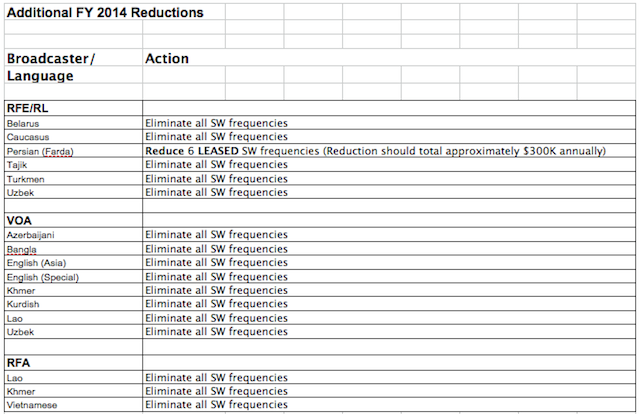BBG Watch Commentary
In deciding suddenly with only a two-days notice on the date for shortwave radio broadcasting cuts, executives in charge of the International Broadcasting Bureau (IBB), which operates radio transmissions for the Broadcasting Board of Governors (BBG), have once again shown little consideration for loyal radio listeners of many years, as well as for Voice of America (VOA), Radio Free Asia (RFA), and Radio Free Europe / Radio Liberty (RFE/RL) journalists and broadcasters who prepare shortwave radio broadcasts.
The news of terminations of broadcasts definitely came as a complete surprise to VOA radio listeners and VOA broadcasters who put these programs on the air. IBB just announced it wants to terminate numerous shortwave radio transmissions at the end of the day on June 30, 2014 in a massive and in most cases complete cut affecting many countries without free media: Belarus, Caucasus, Iran, Tajikistan, Turkmenistan, Uzbekistan, Azerbaijan, Iraq (Kurdish), Cambodia, Laos, and Vietnam.
At the very least, BBG members should intervene and tell IBB and VOA executives that they cannot give radio listeners only a day or two to adjust to such a major change. They should also demand that IBB executives show a little more respect for managers and journalists at VOA, RFA, and RFE/RL. IBB executives claim that they gave plenty of notice to VOA managers who failed to make timely announcements to radio listeners and staff. RFA and RFE/RL managers informed their staff about the changes, but they also did not know until very recently the exact date for the implementation of the transmission cuts.
All shortwave frequencies will also be eliminated for Voice of America English radio broadcasts to Asia, VOA English teaching programs, and VOA programs to Bangladesh.
VOA, RFA, and RFE/RL shortwave radio listeners do not yet know about these cuts becoming effective on June 30, and neither did managers and broadcasters at these media outlets until they received an email from IBB late Thursday night. While some further reductions in shortwave transmissions were anticipated as part of general budget cuts, managers and broadcasters at BBG entities were surprised to learn from IBB that they had only a couple of days to prepare for such a drastic move and equally short time to alert their audiences. Many VOA journalists still do not know this is happening, as the word about the cuts reached only some staffers Friday afternoon, sources told us.
This is a new low in contempt being shown by IBB executives for these media outlets and their managers and journalists. While these shortwave cuts were being discussed earlier, the sudden announcement from IBB that they will take effect in two days was a complete shock to the staff, sources told BBG Watch.
Thanks to IBB executives who surprised everyone with their decision to cut numerous shortwave transmissions on June 30, international audiences will now have at best only a day or two to learn about these massive terminations of radio broadcasts.
IBB’s senior bureaucrats have no respect for anyone: VOA, RFA, and RFE/RL as institutions, their managers and their journalists, and least of all for international radio audiences.
How can you tell someone with only two days notice that they will have to find other ways of getting news or, in the case of broadcasters, adjust to producing programs for new platforms?
Note: Apparently, Russian to the Caucuses shortwave transmissions originating from IBB’s own transmitters will be retained.
The following note being distributed at VOA confirms that VOA broadcasters were caught completely off guard by the IBB decision and that VOA radio listeners will have at best a day or two to learn that their programs will no longer be available on shortwave.
“FAREWELL TO SHORTWAVE
We were informed late Friday that BBG’s proposed shortwave cuts for FY2014 have been approved by Congress.
As of the end of the day on Monday, June 30th, all shortwave frequencies for English News programs to Asia will be eliminated. We will no longer be heard via shortwave in the morning (12-16 utc), and the evening (22-02utc)…mostly in Asia.
Shortwave frequencies for the following services will also be eliminated: Azerbaijani, Bangla, English (Learning), Khmer, Kurdish, Lao and Uzbek. Shortwave being used by services at RFE/RL and RFA are also being cut.
Because shortwave has been a cheap and effective way to receive communications in countries with poor infrastructure or repressive regimes, it was a good way to deliver information. But broadcasting via shortwave is expensive, and its use by listeners has been on the decline for years. At the BBG, the cost vs. impact equation no longer favors broadcasts via this medium to most of the world.
Important for us is that we will continue to be heard on shortwave frequencies during those hours we broadcast to Africa. Also, we know through our listener surveys that about half of our audience in Asia and the rest of the world listens to us via the web and podcast – so all is not lost.
Let’s break the news about this change to our audiences starting Sunday night. I doubt specific frequencies are critical to announce. The important point to make for our listeners is that we encourage their continued listening through local affiliates, and on the web at voanews.com.”
The following comment was posted on Facebook:
“Stupid is as stupid does. And the BBG/IBB management does not excel in its vision or strategic abilities.”
PCJ Media and PCJ Radio broadcaster in Taiwan Keith Perron reported on Facebook:
“Talked to a friend in Beijing who posted the news about the VOA dropping shortwave on Weibo. His first posting was cut, but he kept doing it. In the last couple of hours it has been re-posted by over 400 users and re-written to get around the censors, by using codes in Chinese. One of the posts is getting on average 10 comments every 1 to 2 mins. I want to link it here, but when Weibo sees a link connected with facebook they cut it.”
Some of the comments on the PCJ Media and PCJ Radio Facebook Page:
“If no one listens please tell me how Weibo in China has been able to have over 400 comments on this in the last two hours about cutting it?”
“It’s like an atom bomb falling on International broadcasting.”
“A decision made by officials who don’t know about communications.”
“Don’t get me started. The VOA wouldn’t know that the Kurds are close to achieving their stated aim of a Kurdish state in parts of Iraq, Syria and Turkey and threaten parts of Iran. High in the mountains, do you think they listen to online streaming of VOA. Still, the crap VOA turns out these days they’re doing us all a favor by going off shortwave.”
“In the Far East and Southeast Asia VOA still has a big SW audience, sure smaller than 20 years ago. But In China for example you can go to any village and town and second tier and third tier city and very easily find people that sill listen.”
PCJ Radio posted a parody Voice of America broadcast to make the point how insensitive executives were toward VOA audiences, particularly those without means to use expensive technology.
Voice of America special newscast from June 29, 2014 about the cuts to services. https://t.co/UXhNHPSaMy
— PCJ Radio (@PCJMedia) June 29, 2014
A former Voice of America broadcaster observed that a major part if not most of the audience of VOA is still radio. Why would the Broadcasting Board of Governors and the International Broadcasting Bureau cut most of the radio, especially to a critical part of the globe like Asia and to countries where English is the preferred second language, especially China? This move is suicidal. The Broadcasting Board of Governors and the International Broadcasting Bureau will destroy Voice of America before any reform legislation is passed.
VOA Asia programmers had no clue as of most of the day Friday that shortwave radio transmissions of their VOA English broadcasts to Asia will end on Monday.
Thank you shortwave listeners of Daybreak Asia and China Focus. I had less notice we're off the air than many of you. #blindsided
— Jim Stevenson (@VOAStevenson) June 29, 2014
#VOA will abruptly cease English language shortwave #radio transmissions to #Asia after tomorrow (Monday).
— Steve Herman (@W7VOA) June 29, 2014
For millions of listeners, shortwave radio is the only means to hear Daybreak Asia, today it's for the last time… http://t.co/cBMvtCfgyA
— Jim Stevenson (@VOAStevenson) June 29, 2014
#VOA English language via shortwave to Africa will continue. Broadcasts in 6 other languages also silenced this week.
— Steve Herman (@W7VOA) June 29, 2014
Shortwave radio cutbacks also affect @RFERL and #@RadioFreeAsia. Requested by @BBGgov and approved by Congress.
— Steve Herman (@W7VOA) June 29, 2014


Comments are closed.